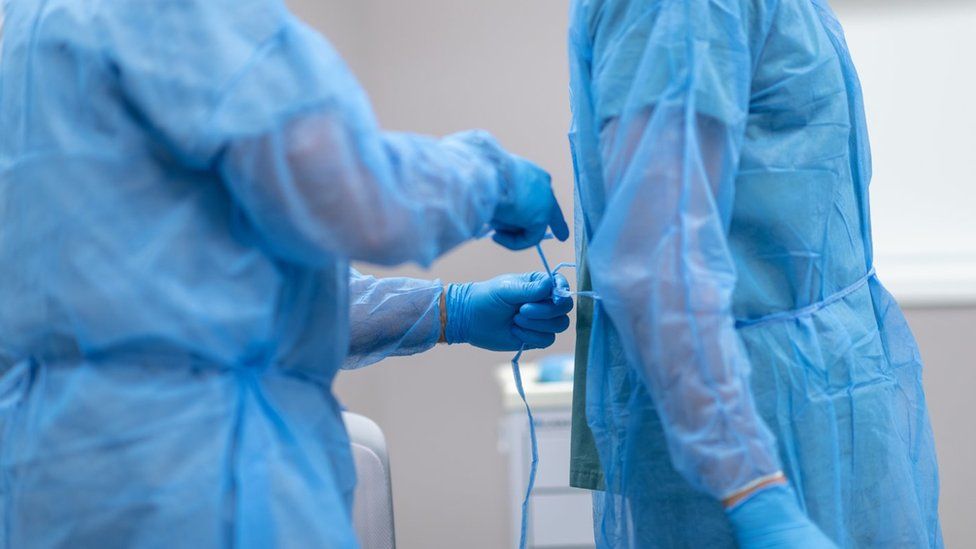
The Royal College of Surgeons say the specialist hubs will allow elective and planned surgeries to happen without cancellations.
By Marie-Louise Connolly
BBC News NI health correspondent
A leading Northern Ireland surgeon says specialist surgical hubs are the best way to tackle the backlog of operations.
Surgical hubs separate elective or planned surgery from emergency care, which means less serious operations are not cancelled.
Niall McGonigle said the surgical model, in operation since 2021, was already showing positive improvements.
He added that patients would need to be prepared to travel for their surgery.
Speaking to BBC News NI ahead of the publication of the latest hospital waiting list figures, the NI director of the Royal College of Surgeons said surgical hubs in Northern Ireland were in their infancy.
“When we look at the surgical hubs in England, they have delivered a huge volume of surgery,” Mr McGonigle said.
“They have brought down waiting lists in certain areas and I am sure that will be replicated here.”
Where are surgical hubs in NI?
Lagan Valley Hospital in Lisburn and Omagh Hospital provide day case surgery.
The Mater in Belfast, Daisy Hill in Newry and the South West Acute Hospital in Enniskillen offer overnight stays for more complicated cases where an anaesthetist and surgeon will remain in the hospital until their patient leaves.
Day surgery takes place on the same day as the patient arriving and leaving hospital for example cataracts
Overnight surgery means the patient requires an overnight stay and the surgeon and anaesthetist will remain on the hospital site, for example for a hernia.
Becoming a surgical hub has secured the future of the South West Acute Hospital, according to Mark Gillespie, director of surgery and paediatrics at the Western health Trust.
Built in 2012, the state-of-the-art hospital has been underutilised.
Mr Gillespie said the role of the hospital had been turned around, with more than 1,300 patients receiving surgical care since January 2023.
“We need more people to come,” he said.
“We need the population of NI to be bought into the idea of travel because that will give us more timely access to theatres and patients will be seen a lot quicker and will have a more positive experience.”
Mr Gillespie said the hospital had treated patients who live in the Belfast, the South Eastern and Southern health trust areas.
‘Prepare to travel’
One person who has been removed from the hernia waiting list is Damien Breen.
He did not have far to travel but he had been waiting two years for a hernia operation.
He said he had been in a lot of pain and discomfort and was just relieved to get the operation done, but he added that it helped having family close by to visit and to drive him there and pick him up when it was time to go home.
It is that “close to home” mentality that surgeons want to see overturned.
The Royal College of Surgeons argues that specialist surgeons are prepared to travel if it means they get to perform operations and make patients better again.
The college says surgical hubs have many pluses including that beds and theatre slots are protected so they will not be usurped by emergency cases, as they are being treated elsewhere.
Mr Gillespie said patients – including those making the two-hour journey from Belfast – were generally happy with the experience.
He recalled one man who had been waiting more than four years for gallbladder surgery.
“The patient left home at 05:30, was on the table for 10:00 and had his surgery completed,” he said.
“He went home the next day and was glowing in terms of the care.”
Niall McGonigle said people must be prepared to travel for the hubs to work
The success of the surgical hub model is reliant on several factors, including patients signing up to travel and, according to Mr McGonigle, “political stability.”
“I have been back here as a consultant for seven years and in that seven years we have had an executive for two years,” he said.
“There is no doubt that those problems that we have both within healthcare, education and elsewhere are related to a lack of political stability.”








